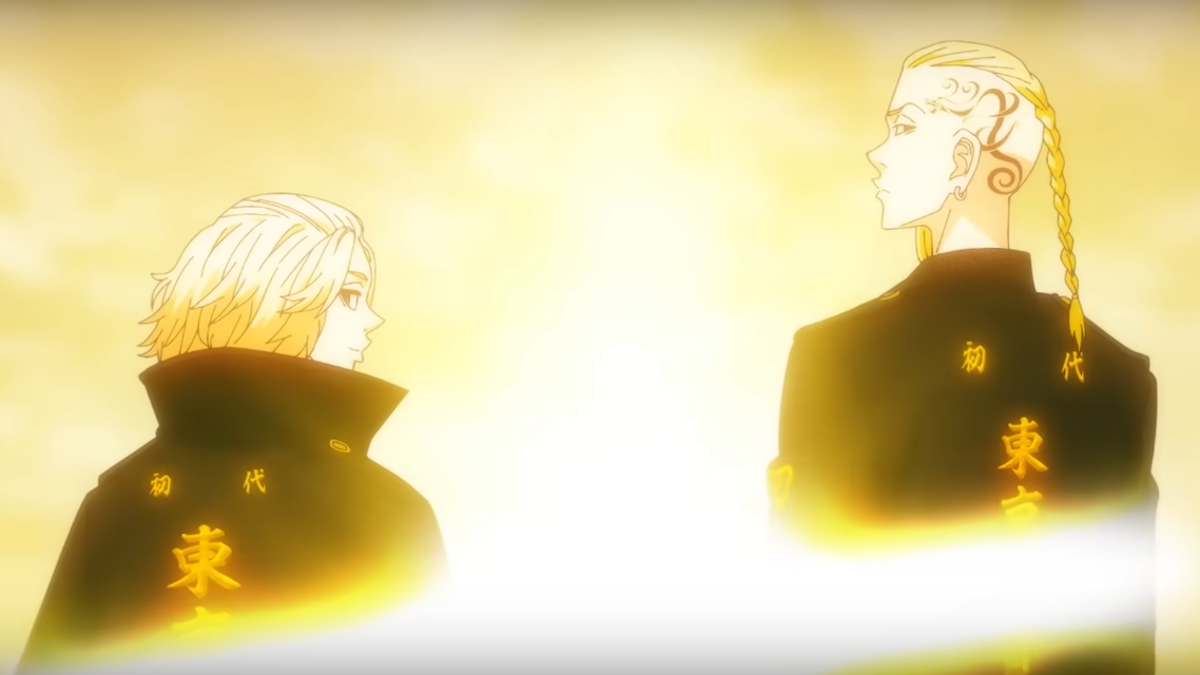Tokyo Revengers is about a youth toughs in the Tokyo Manji Gang. The manji symbol (卍), the Buddhist swastika, appears on the Japanese-language manga title and throughout the original anime. It has been removed from the anime’s English language release, apparently because it might cause confusion with the Nazi swastika.
Sankaku Complex (NSFW site) points out that the symbol has been removed from the Crunchyroll release—something fans have noted since the series began airing.
For example, here is a screenshot from the Japanese opening:
And the Crunchyroll one:
As Kotaku previously reported, if you’ve ever been to a Buddhist temple in Japan or looked at a Japanese map, you’ve probably seen manji swastikas. The manji has long been a holy and auspicious symbol in Japan and throughout Asia.
The Japanese have another word for the Nazi swastika: haakenkuroitsu (ハーケンクロイツ), or “hakenkreuz,” which is German for swastika. The Nazi swastika often is tilted, but not always; however, Japanese Buddhism uses both left and right-facing manji. The left-facing horizontal manji is used to mark Buddhist temples. The Tokyo Manji Gang is not connected to Nazism.
The manga debuted in 2017, which was a year after the manji symbol became slang among Japanese youth. The ancient, auspicious meaning remained, but it gained an array of new meanings in Japan. For example, kids would say it when they’re taking photos like the English word “cheese,” and it’s also used to refer to mischievous or excitable personality. Other uses include “to appear strong,” “high class,” a symbol of someone running (sometimes depicted with Final Fantasy’s Cactuar), and a pun on the Japanese word maji (まじ), meaning “seriously” or “really.” Again, it was unrelated to Nazism.
There have been reported there were plans to drop the manji symbol on Japanese maps because Westerners might mix it up with the Nazi stain which hate groups continue to embrace. Considering the influx of international tourists in the pre-covid era, the horrific stigma the Nazi mark has, and how similar the symbols are, that is understandable. Things can get muddled further by the fact Japan was Germany’s ally during WWII.
This is a lot of context that’s necessary to understand the character’s meaning! If one did not know this, and simply glanced at the anime, one might think it was about a hate group. Its inclusion could be distracting and cause confusion. The decision to remove the symbol in the English language release is no surprise and understandable, even if this manji is not a malicious mark, because the Nazi one sure is.
Kotaku
Source link
Related Post:
- Platinum End anime gets trailer, Crunchyroll release date at SDCC 2024
- Watch Blade Runner: Black Lotus anime’s opening out of Crunchyroll Expo
- Muv-Luv Alternative Anime Series Will Air on Crunchyroll
- Sony Completes Acquisition of Anime Giant Crunchyroll
- Sony Now Owns Anime Site Crunchyroll
- Wreckfest Is Getting a (Censored) Carmageddon Crossover on PS5, PS4
- Star Wars anime Visions trailer, studios, release date announced at Anime Expo
- Tokyo Olympics Anime Short Tomorrow’s Leaves Shared
- Sony’s Funimation buys Crunchyroll for $1.2 billion — what happens now?
- Rumour: Sony Planning More Expensive PS Plus Option That Could Include Crunchyroll
